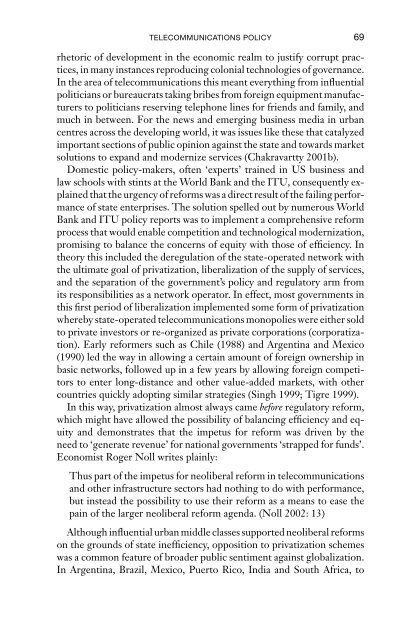Media Policy and Globalization - Blogs Unpad
Media Policy and Globalization - Blogs Unpad
Media Policy and Globalization - Blogs Unpad
You also want an ePaper? Increase the reach of your titles
YUMPU automatically turns print PDFs into web optimized ePapers that Google loves.
TELECOMMUNICATIONS POLICY 69<br />
rhetoric of development in the economic realm to justify corrupt practices,<br />
in many instances reproducing colonial technologies of governance.<br />
In the area of telecommunications this meant everything from influential<br />
politicians or bureaucrats taking bribes from foreign equipment manufacturers<br />
to politicians reserving telephone lines for friends <strong>and</strong> family, <strong>and</strong><br />
much in between. For the news <strong>and</strong> emerging business media in urban<br />
centres across the developing world, it was issues like these that catalyzed<br />
important sections of public opinion against the state <strong>and</strong> towards market<br />
solutions to exp<strong>and</strong> <strong>and</strong> modernize services (Chakravartty 2001b).<br />
Domestic policy-makers, often ‘experts’ trained in US business <strong>and</strong><br />
law schools with stints at the World Bank <strong>and</strong> the ITU, consequently explained<br />
that the urgency of reforms was a direct result of the failing performance<br />
of state enterprises. The solution spelled out by numerous World<br />
Bank <strong>and</strong> ITU policy reports was to implement a comprehensive reform<br />
process that would enable competition <strong>and</strong> technological modernization,<br />
promising to balance the concerns of equity with those of efficiency. In<br />
theory this included the deregulation of the state-operated network with<br />
the ultimate goal of privatization, liberalization of the supply of services,<br />
<strong>and</strong> the separation of the government’s policy <strong>and</strong> regulatory arm from<br />
its responsibilities as a network operator. In effect, most governments in<br />
this first period of liberalization implemented some form of privatization<br />
whereby state-operated telecommunications monopolies were either sold<br />
to private investors or re-organized as private corporations (corporatization).<br />
Early reformers such as Chile (1988) <strong>and</strong> Argentina <strong>and</strong> Mexico<br />
(1990) led the way in allowing a certain amount of foreign ownership in<br />
basic networks, followed up in a few years by allowing foreign competitors<br />
to enter long-distance <strong>and</strong> other value-added markets, with other<br />
countries quickly adopting similar strategies (Singh 1999; Tigre 1999).<br />
In this way, privatization almost always came before regulatory reform,<br />
which might have allowed the possibility of balancing efficiency <strong>and</strong> equity<br />
<strong>and</strong> demonstrates that the impetus for reform was driven by the<br />
need to ‘generate revenue’ for national governments ‘strapped for funds’.<br />
Economist Roger Noll writes plainly:<br />
Thus part of the impetus for neoliberal reform in telecommunications<br />
<strong>and</strong> other infrastructure sectors had nothing to do with performance,<br />
but instead the possibility to use their reform as a means to ease the<br />
pain of the larger neoliberal reform agenda. (Noll 2002: 13)<br />
Although influential urban middle classes supported neoliberal reforms<br />
on the grounds of state inefficiency, opposition to privatization schemes<br />
was a common feature of broader public sentiment against globalization.<br />
In Argentina, Brazil, Mexico, Puerto Rico, India <strong>and</strong> South Africa, to

















